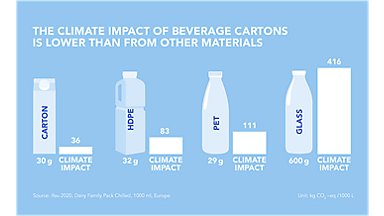Go Nature. Go Carton.
OVERVIEW ACTIONS SUSTAINABLE SOLUTIONS EXPLORE
Our ambition
Adolfo Orive, President and CEO of Tetra Pak talks about our ambition to create the ultimate sustainable food package – that secures food safety and availability while reducing the impact on our planet.
Watch our film
Our ambition
Adolfo Orive, President and CEO of Tetra Pak talks about our ambition to create the ultimate sustainable food package – that secures food safety and availability while reducing the impact on our planet.
Watch our film
Our collaborations
Giving our carton packages a second life
Our collaborations
Giving our carton packages a second life
Packaging for good: inside and out
Protects food
Food packaging has played a vital role in the development of civilisation. This short film developed together with National Geographic, explores the evolution of food processing and packaging in making food accessible, and how it is fundamental to keeping our future fed.
Watch now
Protects food
Food packaging has played a vital role in the development of civilisation. This short film developed together with National Geographic, explores the evolution of food processing and packaging in making food accessible, and how it is fundamental to keeping our future fed.
Watch now
Protects the planet
Visit National Geographic to learn more about Packaging for good.
Protects the planet
Visit National Geographic to learn more about Packaging for good.
Get the full picture
Packaging plays a critical role in the global food delivery system, helping keep food safe, nutritious and available for people around the world. But it can also cause problems for the planet. Watch this video to understand where the solution lies.
Watch our film
Get the full picture
Packaging plays a critical role in the global food delivery system, helping keep food safe, nutritious and available for people around the world. But it can also cause problems for the planet. Watch this video to understand where the solution lies.
Watch our film








